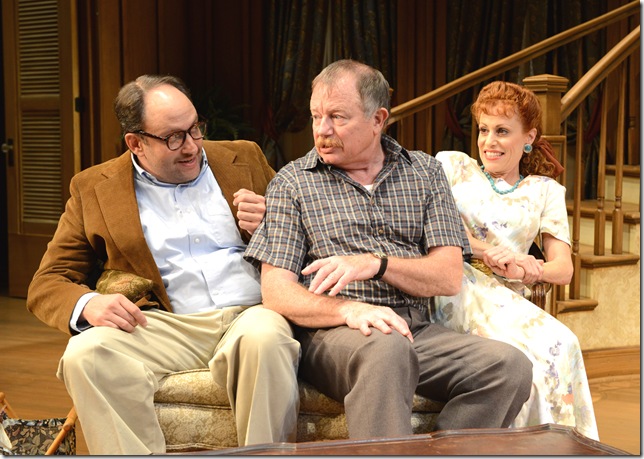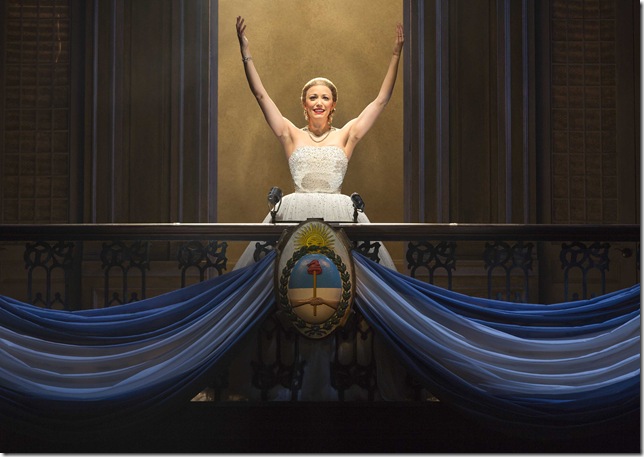Take economic bad times, add a land-rich but cash-poor clan brimming with selfish money-grubbers and you have a recipe for a dysfunctional family play like Dividing the Estate, which landed on Broadway for 50 performances in late 2008 and early 2009, just before its author, the prolific Horton Foote, passed away.
He again takes us to fictional Harrison, Texas, the site of so many of his scripts, where the venal Gordon family is circling like vultures around its matriarch, plump, iron-fisted Stella (Mary Stout). The year is 1987, the oil-dependent region is reeling and two of Stella’s grown children — alcoholic spendthrift Lewis (Rob Donohoe) and sour, acquisitive Mary Jo (Kim Cozort) — are tired of waiting for her to die.
They want her estate divided and disbursed now, against the wishes of their sister, practical Lucille (Elizabeth Dimon), and Lucille’s son, called simply Son (Gregg Weiner), a worrywart who gave up his career for the thankless task of managing the family’s assets.
This could be the stuff of melodrama, but Foote saw the humor in the situation, comedy being tragedy that happens to someone else. The Gordons may not be very likeable, but they are recognizable. In a similar way, Dividing the Estate may not be particularly profound, but it is entertaining.
Foote writes in a comfortable, old-fashioned style, with an emphasis on character. Early on, he fills the play with exposition and in the final scene he cannot seem to decide how to end it efficiently, but on balance it is more than stageworthy.
At Palm Beach Dramaworks, Director William Hayes fills the stage with familiar faces and pulls complex, realistic performances from his cast in roles that could have easily drifted into caricature.
As Lewis, who already has borrowed $200,000 of his share, Donohoe harbors a secret reason for needing even more. And Cozort’s Mary Jo, who moved away to Houston, has been racking up sizeable debts, in part due to her whiny, materialistic daughters, Emily (Gretchen Porro) and Sissy (Leah Sessa). Even the family’s domestic help has developed a case of avarice, eager to learn what they will get from the estate.
Dramaworks’ winning formula — a good script, a first-rate ensemble and impressive design work — adds up to a production to see, whether or not you recognize your own family on that stage.
DIVIDING THE ESTATE, Palm Beach Dramaworks, 201 Clematis St., West Palm Beach. Through Sun., April 27. Tickets: $60. Call: (561) 514-4042.
* * *
The name Andrew Lloyd Webber conjures images of crashing chandeliers, warbling cats and roller-skating trains. The most commercially successful composer in the musical theater never met an excuse for stage spectacle that he didn’t like.
But before he became synonymous with pretentious excess, in his early days when he collaborated with lyricist Tim Rice, he wrote a brilliant, human-scale musical called Evita. The fact-based saga of an ambitious woman named Eva Duarte who climbed to prominence in Argentina, sleeping her way to the top, she became a saint to the population, even as she swindled and bankrupted the nation. Now that is the stuff of drama.
The show’s score was first heard on a concept album in 1976, which director Hal Prince then illustrated with imaginative pageantry on stage in London and New York. Those images have become such a part of the musical that there had never been a major production without them, until Britain’s Michael Grandage gave it a new look in a revival that came to Broadway in 2012. A road company of that revival has been touring for the past year and it plays the Kravis Center this week through Sunday.
Grandage has some effective staging twists, but much of the show seems different for the sake of being different. For instance, there’s the song “The Art of the Possible,” in which Juan Peron rises in the ranks above his rival officers. In the original production, that idea was conveyed with a game of musical chairs. In Grandage’s version, it becomes a series of one-on-one wrestling matches.
Prince ended the first act with an angry protest vigil as the ensemble sang “A New Argentina.” To Grandage, the song was an opportunity to illustrate the ballot stuffing that brought Peron to power, an equally valid approach, but with far less heat.
Christopher Oram’s scenic design recreates the presidential palace, Casa Rosada, with its high vaulted windows and imposing balcony, foreshadowing Eva’s Big Song — the stirring, though manipulative “Don’t Cry for Me, Argentina.”
On Broadway, this revival was dominated — at least at the box office — by the presence of Ricky Martin as Che, the cynical narrator/stage manager. On tour, he is played Josh Young, who insinuates himself into the action, singing with a strong, seductive upper register.
But the production belongs to Caroline Bowman as Evita, a genuine find plucked from the cast of Kinky Boots. She easily projects the necessary charisma that captivates the nation, but with an underlying toughness that is palpable. She belts the score with authority and exceptional diction, no easy feat when she is kicking up her heels to Rob Ashford’s choreography in a production number like “Buenos Aires.”
Peron inevitably comes in a distant third, for the role is drastically underwritten, but lacquer-haired Sean MacLaughlin leaves a solid impression at least.
In all, it is a worthy road edition of a musical that has withstood the ravages of age and proven itself to be timeless. Evita ran far less time on Broadway than Cats or Phantom of the Opera, perhaps because it is darker in tone. But as this revival demonstrates, it remains a dramatically potent history lesson, brought to life by Lloyd Webber at the top of his game.
EVITA, Kravis Center, 701 Okeechobee Blvd., West Palm Beach. Through Sunday. Tickets: From $25 up. Call: (561) 832-7469.

